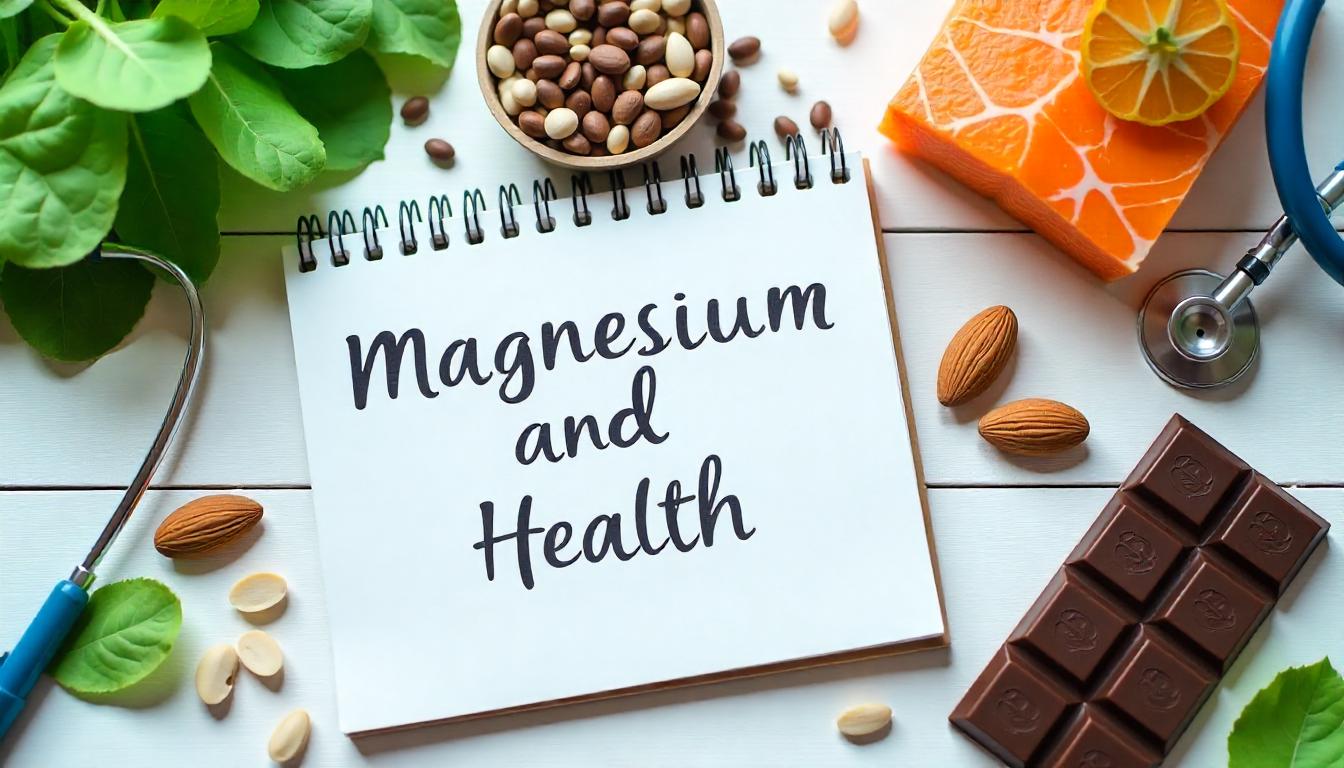Introduction: Understanding Magnesium and Health
Health and magnesium go hand in hand. This vital mineral affects everything from emotional stability to muscular function and is involved in over 300 metabolic reactions in the body. However, one of the most disregarded dietary issues in the US is still magnesium deficiency.
The effects of magnesium on your general health, the finest natural sources, symptoms of a deficiency, and whether you need a supplement to meet your daily needs will all be covered in this article. Magnesium is important for supporting bone health, lowering stress, and enhancing sleep.
Why Magnesium Is Essential for Good Health and Overall Magnesium and Health
Magnesium is a macromineral that supports critical body functions, including:
- Regulating blood pressure
- Supporting muscle and nerve function
- Building strong bones and teeth
- Controlling blood sugar and insulin levels
- Helping convert food into energy
Without enough magnesium, your body can’t perform at its best.
Key Health Benefits of Magnesium
1. Improves Sleep Quality and Relaxation with Magnesium and Health
Magnesium facilitates falling and staying asleep by calming the nervous system and promoting the synthesis of melatonin.
2. Reduces Anxiety and Stress
Mood problems are associated with low magnesium levels. It promotes neurotransmitter balance and cortisol regulation.
3. Strengthens Bones
Maintaining bone density and avoiding osteoporosis depend on calcium absorption, which magnesium aids with.
4. Regulates Heart Health
It maintains blood vessel function, keeps the heartbeat steady, and may reduce blood pressure.
5. Supports Muscle Performance
Magnesium is particularly beneficial for athletes as it aids in muscle contraction and recuperation, minimizing cramps and spasms.
Common Signs of Magnesium Deficiency
Many people are deficient in magnesium without realizing it. Symptoms may include:
- Muscle cramps or twitching
- Chronic fatigue or weakness
- Anxiety, depression, or irritability
- Trouble sleeping
- Irregular heartbeat
- Headaches or migraines
Learn more: Magnesium Deficiency in the United States: Signs, Causes, and Best Supplements
How to Get Magnesium Naturally
Eating a magnesium-rich diet is the best way to support your health. Here are some top food sources:
Leafy Greens
- Spinach
- Swiss chard
- Kale
Nuts and Seeds
- Pumpkin seeds
- Almonds
- Cashews
Whole Grains and Legumes
- Quinoa
- Brown rice
- Black beans
- Chickpeas
Seafood and More
- Salmon
- Mackerel
- Avocados
- Bananas
- Dark chocolate (choose 70% cocoa or more)
Related post: Top 10 Magnesium-Rich Foods in the United States
Should You Take a Magnesium Supplement?
If you’re not getting enough from food or have absorption issues, a supplement can help. Popular forms include:
- Magnesium Glycinate – gentle and great for sleep and anxiety
- Magnesium Citrate – easily absorbed, helpful for constipation
- Magnesium Oxide – budget-friendly but less bioavailable
Recommended: Doctor’s Best High Absorption Magnesium Glycinate
Always consult your doctor before starting supplements, especially if you take medication or have kidney issues.
Also read: Best Time to Take Magnesium for Sleep and Stress Relief
Special Magnesium Needs for Women
Magnesium plays a unique role in women’s health, particularly during:
- Menstruation (helps with cramps)
- Pregnancy (supports fetal development)
- Menopause (supports bone density and mood)
Read more: Magnesium for Women: Benefits, Dosage & Deficiency Signs
Balancing Magnesium and Calcium
Magnesium and calcium work together — calcium contracts muscles, magnesium relaxes them. An imbalance (too much calcium, too little magnesium) can lead to tension, cramps, and even long-term health concerns.
Related post: Magnesium vs. Calcium: Which Does Your Body Need More?
Best Practices for Healthy Magnesium Levels
- Eat a magnesium-rich diet
- Manage stress (chronic stress depletes magnesium)
- Limit alcohol and processed food
- Supplement wisely if needed
- Monitor with your healthcare provider
FAQs About Magnesium and Health
Q1. How much magnesium do I need daily?
Most adults need 310–420 mg per day, depending on age and gender.
Q2. Can I get too much magnesium?
Too much food is rare, but supplements can cause diarrhea or more serious issues if overused.
Q3. Is magnesium good for migraines?
Yes. Studies suggest it can help reduce migraine frequency and severity.
Q4. Can magnesium help with PMS?
Yes, it may reduce bloating, mood swings, and cramping.
Conclusion: Make Magnesium and Health Part of Your Wellness Routine
Amazon Affiliate Disclosure: This article may contain affiliate links. As an Amazon Associate, I earn from qualifying purchases, at no extra cost to you.
Disclaimer: This content is for informational purposes only and does not substitute professional medical advice. Always consult your healthcare provider before making health decisions.
Magnesium is essential to nearly every system in your body — from your brain and heart to muscles and bones. A balanced diet full of whole, unprocessed foods is the best way to ensure healthy levels. If you’re feeling low in energy, sleep-deprived, or stressed out, magnesium may be the missing piece.
Be mindful of your intake, consider a supplement if needed, and make magnesium part of your overall health plan.
Shop Now: Explore trusted magnesium supplements on Amazon
Trusted Source: Healthline’s Full Guide to Magnesium
Related Articles:

